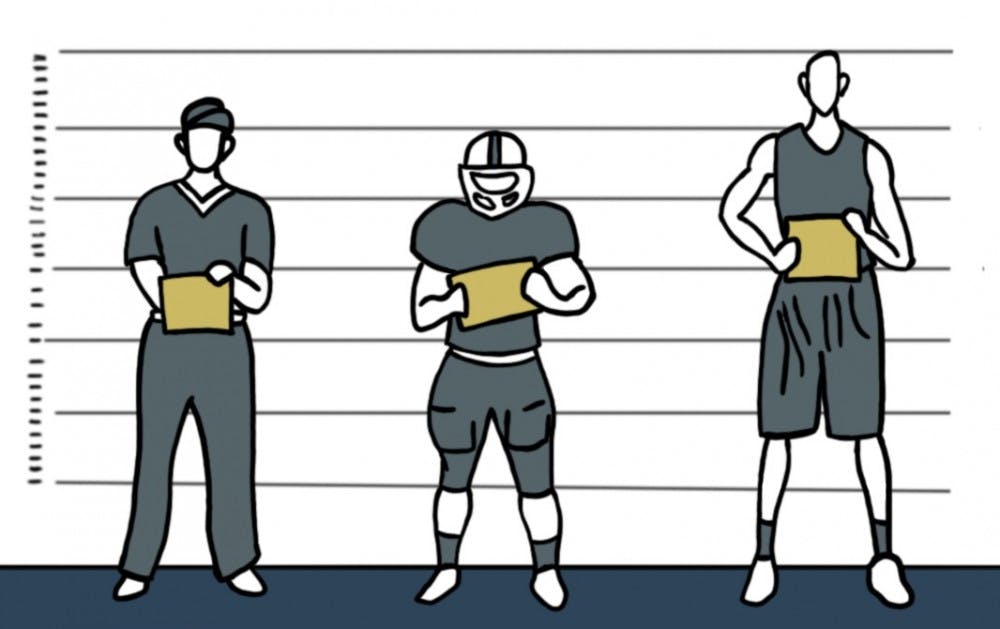From under-the-table payments, academic dishonesty and even shoplifting charges, many fans have seen their favorite young athletes busted over the years. Recent NCAA basketball scandal has brought collegiate sports misconduct to the front pages once again.
In the wake of these incidents, players must hold themselves accountable — but coaches also have to present themselves as role models.
When the Yahoo! Sports story regarding teams wrongfully paying athletes broke, many prestigious college basketball programs were called into question. Among them were Duke University, the University of North Carolina at Chapel Hill and the University of Kentucky, three NCAA basketball powerhouses.
Also on the list of schools reported in the FBI probe were Pac-12 competitors University of Southern California and the University of Washington. Yet, probably the most notable to ASU students was the mention of rival UA.
Misconduct in college sports doesn't stop at the higher levels with alleged $100,000 payouts.
Just last year, three UCLA players were detained overseas for shoplifting. In 2015, a Baylor University football player was initially convicted of sexual assault charges, which have now been overturned on appeal. Brock Turner, notorious ex-Stanford University swimmer, is currently in the process of appealing his sexual assault charges after serving only half of his six-month sentence.
"Simply put, people who engage in this kind of behavior have no place in college sports. They are an affront to all those who play by the rules," said NCAA President Mark Emmert in a statement released after the Yahoo! Sports story broke. "These allegations, if true, point to systematic failures that must be fixed and fixed now if we want college sports in America."
However, as potential role models and representatives of their universities, collegiate players and coaches need to personally hold themselves to a higher standard of conduct.
Veteran sports reporter and professor of practice at ASU's Walter Cronkite School of Journalism and Mass Communication, Paola Boivin, said there is plenty of blame to share.
"First, I think it starts with the individual," Boivin said. "I think the individual has a responsibility when they're representing a university to make good decisions. Often you're dealing with teenager (players), and I think that coaches have a responsibility to steer people in the right direction."
Although coaches have a responsibility to hold their players accountable, it doesn't stop there.
"Ultimately it reflects on the athletic director, fairly or not," Boivin said. "That's just how the public sees it. So I think there's plenty of blame and responsibility to go around."
We see this exemplified with former Michigan State University athletic director, Mark Hollis, who stepped down from his position after the sexual misconduct scandal surrounding former university doctor Larry Nassar reached national attention.
These misconduct charges and violations that are consistently happening in the world of collegiate athletics are a result of societal issues that must be confronted.
"When kids come to college, they bring their baggage, they bring how they were raised," Boivin said. "Issues that are affecting society are going to affect college, as much as the coaches might harp on staying out of it. People may be coming in less educated, maybe poorer, maybe did not have a great role model growing up. That doesn't go away once they get to college and suddenly have a coach that cares about them."
To remedy this, coaches and programs must be willing to create a supportive but firm environment. With social media at an all-time high, these coaches and players have to hold themselves to a very high standard.
Many of these athletes are still just teenagers who are put in a high-pressure situation and need guidance, so it is necessary to help them stay out of trouble.
"Your job as a college coach is not only to produce great basketball players, but to help these kids grow as people," Boivin said.
Developing that responsibility will always start with the relationship between the players and coaches.
"You can hand them a sheet from the NCAA that tells them the rules, you can preach this and that, but coaching is teaching," Boivin said. "What makes a good teacher is someone who does provide a nurturing environment where you're allowed to fail but feel like there's still support there."
Ultimately, players will always look up to their coaches. In asking these young athletes to hold themselves to a high standard, it is imperative that they see their coaches doing the same.
All of ASU's coaches need to respond to this call-of-action by ensuring mutual trust and respect among their teams. Luckily, ASU has been out of the spotlight in these recent scandals, and hopefully that means the University is clean. But there's always room for improvement. Coaches should continue to strive to create not just great athletes, but upstanding members of their communities.
It's easy to look at ASU's lack of press in these topics as a success story, but that alone isn't enough. If the measure for success within student athletics is whether or not they're caught in acts of wrongdoing, we have failed.
Reach the columnist at kcdoyle2@asu.edu or follow @kellydoyle06 on Twitter.
Editor’s note: The opinions presented in this column are the author’s and do not imply any endorsement from The State Press or its editors.
Want to join the conversation? Send an email to opiniondesk.statepress@gmail.com. Keep letters under 500 words and be sure to include your university affiliation. Anonymity will not be granted.
Like The State Press on Facebook and follow @statepress on Twitter.




